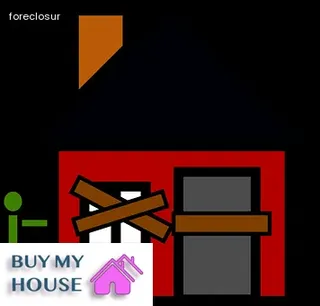Ohio has a unique set of foreclosure laws that are important to understand if you are facing foreclosure. The state follows a judicial foreclosure process and the timeline for completion can vary depending on the lender, court proceedings, and other factors.
Generally, it takes around 4-5 months from the initial notice of default to complete the entire process. The first step in the Ohio foreclosure process is for a Notice of Default to be issued by the lender and sent to the borrower.
This is followed by a three-month period during which time the borrower has an opportunity to cure their debt before foreclosure begins. If this is not done, then a Complaint will be filed in court by the lender and served upon the borrower.
The court must also issue an Order of Sale, which sets out details about how and when bidding will take place at an auction. After these steps have been taken, if no bidder offers more than what is owed in debt, then the property will be transferred back to the lender at completion of sale.

In Ohio, the preforeclosure process can be a long and complicated affair. To understand the state's foreclosure process, it is important to be aware of the timeline that must be followed. Generally speaking, the entire foreclosure process can take anywhere from four months to two years depending on the individual circumstances of a particular case.
The first step in the preforeclosure process is for lenders to file a complaint against homeowners in default with the court. This complaint will include any fees and costs incurred by the lender due to homeowners not paying their mortgage. Next, homeowners will have a certain amount of time to respond to this complaint, which will vary depending on what county they live in.
Once this response period has expired, homeowners may either pay off their debt or face an auction sale of their home. If neither of these options occurs after 21 days, then foreclosure proceedings will begin and a notice of sale will be sent out. At this point, homeowners have another 21 days to pay off their debt or contest the sale before it officially happens.
After all these steps are completed, lenders may receive title to the property and begin marketing it for sale shortly thereafter. Homeowners should make sure they understand all aspects of Ohio's foreclosure process so they can make informed decisions throughout the entire ordeal.
As a homeowner in Ohio facing foreclosure, you have certain rights that are protected under state law. The first and most important of these is the right to be notified of the foreclosure action.
All steps must be taken in line with the state's foreclosure laws, starting with the lender providing you with written notice at least 30 days before any action is taken. This notification will include your right to request a meeting or mediation session with your lender in an effort to come up with an alternate agreement to avoid foreclosure.
You also have the right to know all costs associated with the foreclosure process as well as opportunities for reinstatement or repayment options that may be available from your lender. As a homeowner, you can also challenge any errors made by the lender during the course of the foreclosure proceedings and even take legal action if it is found that they are not following proper procedure according to Ohio law.
Understanding your rights and what procedures must be followed can help protect you during this difficult time and give you peace of mind throughout the entire process.

In Ohio, foreclosure can be a long and daunting process, but with the right strategies in place, it can be avoided. One of the most important steps is to stay informed about your rights as a homeowner.
Educate yourself on the state's foreclosure laws so that you are aware of how long you have to work out an agreement with your lender or file for bankruptcy. You should also look into refinancing or loan modification options that could help you better manage your debt.
Another way to avoid foreclosure is to seek assistance from government agencies like the Ohio Housing Finance Agency, which offers counseling and other resources to help homeowners in need. Finally, consider setting up an automatic payment plan that would ensure timely payments on any loans or mortgages you take out in the future.
By using these strategies and understanding Ohio's foreclosure process, you can protect your home and put yourself on a path towards financial stability.
Bankruptcy is generally the first option for homeowners struggling to make payments, as it can provide a way out of debt while eliminating most, if not all, of the homeowner's financial obligations. Foreclosure, on the other hand, typically leads to the repossession of a home and all its associated costs.
Both processes have their advantages and disadvantages and should be carefully considered before making any decisions. Bankruptcy offers immediate protection from creditors and may allow homeowners to keep some of their assets while allowing them to reorganize their debt into more manageable payments.
However, it also carries long-term consequences such as damaged credit scores that can take years to repair. Foreclosure may be faster than bankruptcy but it results in damage to one’s credit score for up to seven years and affects future loan eligibility.
Additionally, foreclosure proceedings can be expensive due to court costs and attorney fees that are passed on to the homeowner. Ultimately, homeowners must decide which choice is best for them; however, it is important to note that Ohio has specific laws related to foreclosure that should be taken into account before making any decisions.

In Ohio, missing a mortgage payment can have serious legal implications. If a homeowner fails to make payments for more than 270 days, the lender may initiate foreclosure proceedings.
This means that the lender will take steps to repossess the home and potentially sell it at public auction in order to recoup their losses. The law also allows lenders to pursue criminal charges against homeowners who intentionally fail to make payments; however, this is relatively rare in Ohio.
Homeowners facing foreclosure should be aware of their rights under Ohio law, including the right to seek mediation with their lender or delay foreclosure through bankruptcy protection. Additionally, some counties in Ohio have adopted specialized laws allowing homeowners additional time to pay past due mortgage payments or refinance before foreclosure proceedings are initiated.
Understanding all of these complexities can help you take the necessary steps to avoid such a situation and remain in your home.
Foreclosure timelines in Ohio can be lengthy without legal assistance. The time it takes to complete the process depends greatly on the circumstances surrounding the case and whether an attorney is involved.
Without an attorney, the homeowner may face a foreclosure timeline of up to 12 months or more, including a pre-foreclosure period with several notices from their lender and a court hearing. During this period, the homeowner must attempt to negotiate payment plans with their lender or seek other options such as loan modification or refinancing.
After being served with a foreclosure complaint, they have 28 days to file an answer in court. If they are unable to reach an agreement with their lender during that time, the court will then set a date for a public auction where the property will be sold at market value if no third party purchases it.
After that, the homeowner has 5 days to vacate the home unless a redemption period has been granted by the court.

In Ohio, the timeline for a foreclosure can vary significantly depending on several factors such as whether an attorney is involved or not. Generally speaking, if an attorney is brought in to represent the borrower, they may be able to delay or even prevent the foreclosure process altogether.
The first step of the Ohio foreclosure process is a Notice of Default which must be sent to the homeowner at least 28 days before filing a complaint in court. After this notice is sent, homeowners have 28 days to either cure their default or enter into an agreement with the lender.
If neither of these are done after 28 days, a Complaint will be filed in court and served by sheriff to the homeowner. Once this happens, homeowners have 28 days to answer the complaint and file any counterclaims they may have, otherwise, a judgment of foreclosure may be granted without any further action from them.
The entire process from start to finish typically takes around 90-120 days but can take longer depending on how many defenses are raised by the homeowner and other factors such as local court delays.
Can you stop a foreclosure by selling the home? In some cases, yes. Depending on the circumstances and the state in which you live, it may be possible to sell your home and use the proceeds from the sale to pay off your loan balance in full and avoid foreclosure.
Ohio is no different; however, it's important to understand how long does a foreclosure take in Ohio so that you can assess whether selling your home is a viable option. The state's foreclosure process and laws differ from other states, necessitating careful research into the timelines associated with foreclosures before making any decisions about selling your home.
To do this, you'll need to consider factors such as who holds the note on your mortgage loan, what type of lien was used when creating the loan, whether your loan was sold or transferred during its lifetime, if there are any acceleration clauses included in your mortgage agreement, what type of deed-in-lieu of foreclosure agreement may be available to you, and other important details that could affect how long it takes for foreclosure proceedings to complete. Ultimately, selling your home can be an effective way to avoid a foreclosure if done properly and within the appropriate timeline.

Removing a foreclosure from your credit report is not an easy task, but it is possible. The key to successful removal of a foreclosure from your credit report is to be proactive and take action as quickly as possible.
Start by gathering the necessary paperwork and contact your lender to determine the status of your loan. If your loan has been discharged through bankruptcy, you may be able to have the foreclosure removed from your credit report.
Additionally, if you can prove that the foreclosure was due to an error or identity theft, you may also be able to have it removed. If none of these apply, then you should contact a reputable credit repair company who can assist you with removing the item from your report.
It's important to note that while there is no guarantee that all of these steps will result in a successful removal of the foreclosure from your credit report, they are certainly worth pursuing in order to improve your credit score and overall financial health.
When it comes to foreclosure in Ohio, homeowners have several options they can take if they are faced with an unaffordable mortgage payment. Reinstatement of the loan allows borrowers to make up missed payments and late fees, while a repayment plan allows them to pay off the delinquent amount over time.
Homeowners may also be able to negotiate a loan modification with their lender, which could involve reducing the principal balance or changing the terms of their agreement. Refinancing is another option that could lower monthly payments and even reduce interest rates.
Forbearance of payments is also an option, where lenders will temporarily suspend payments or agree to accept reduced payments for a certain period of time. Finally, homeowners can choose to sell their property through a short sale or deed in lieu of foreclosure.
Each option has its own pros and cons and it’s important that homeowners weigh these carefully before deciding on the best course of action for them.
The foreclosure process in Ohio begins with a Notice of Default. This notice is issued by the lender when a borrower fails to make payments on their mortgage loan.
Once the notice is issued, the borrower has 28 days to respond and cure the default. If they fail to do so, then the lender will proceed with initiating foreclosure proceedings.
The next step in the process is to file a complaint with the court and serve it on the borrower. After that, there is a 21-day period for an answer from the borrower or an opportunity for them to file an objection.
If no response is received within these 21 days, then the court can enter a judgment against the borrower and begin foreclosure proceedings. These proceedings can take anywhere from 4-12 months depending on how many steps are involved in selling off assets such as real estate or personal property.
Ultimately, it takes approximately 6-18 months from start to finish for a foreclosure in Ohio to be completed.

When a foreclosure is completed in Ohio, the homeowner is usually given a specific time period to move out from the property. Generally, this time frame will range from 30 to 90 days depending on the type of foreclosure.
The court determines the length of time for eviction after a foreclosure has been granted and will inform the homeowner of their rights and obligations at that time. While some homeowners are allowed to remain in the home until the eviction date, others may be required to vacate immediately upon completion of foreclosure proceedings.
To avoid further fines or legal action, it is important that homeowners understand and comply with any deadlines set by the court.
After a foreclosure has been finalized in Ohio, the borrower may not have much recourse. In some cases, the borrower will still be responsible for any unpaid debts or fees associated with the foreclosure.
Additionally, the former homeowner's credit score could suffer significantly for up to seven years. The lender may also pursue a deficiency judgment against the borrower to collect any remaining debt after the completion of the foreclosure sale.
Furthermore, foreclosures stay on a person's record for up to seven years and can impact their ability to secure financing or housing in the future. Lastly, it is important to note that while state law limits how lenders can go about collecting on deficiency judgments, they are permitted to take legal action against borrowers in order to receive payment.
If you are behind on your mortgage payments in Ohio, the amount of time it takes to initiate a foreclosure and complete the process can vary. Generally, if you are three or more months behind on your mortgage payments, your lender may start the foreclosure process.
The length of the foreclosure process depends on whether you are dealing with a non-judicial or judicial foreclosure. In non-judicial foreclosures, your lender can begin the process almost immediately after missing three payments.
In contrast, judicial foreclosures require a court order and take longer. The timeline for this type of foreclosure can range from two to six months depending on how quickly the courts process paperwork.
A: In Ohio, the foreclosure process typically takes between four and nine months. This timeline begins with a Notice of Default Judgment and ends with Loss Mitigation.